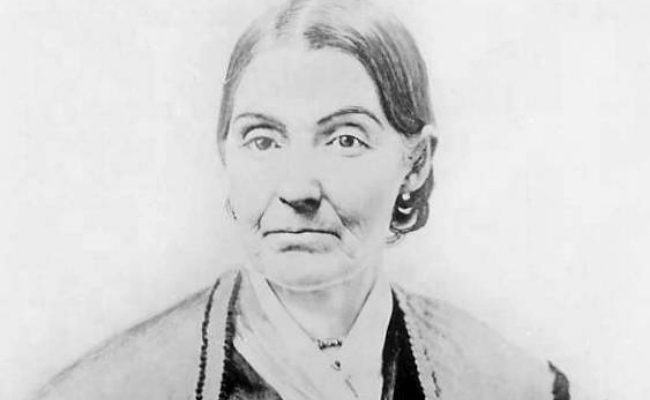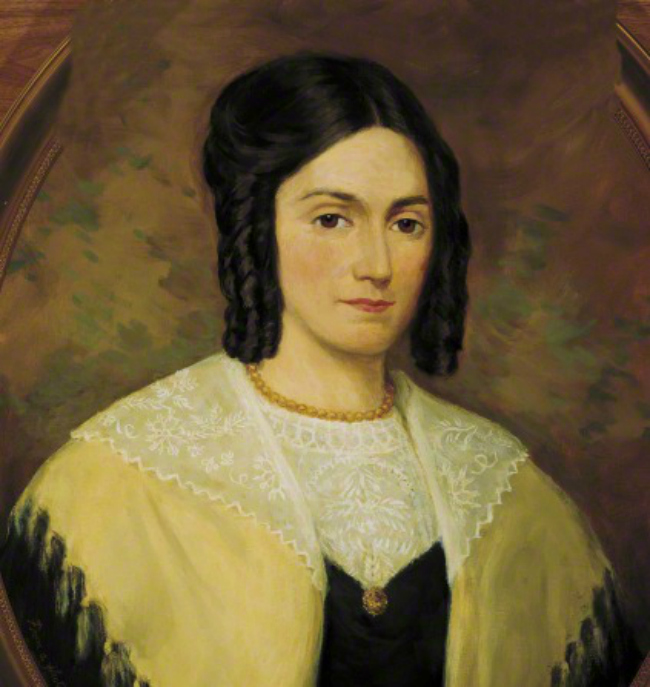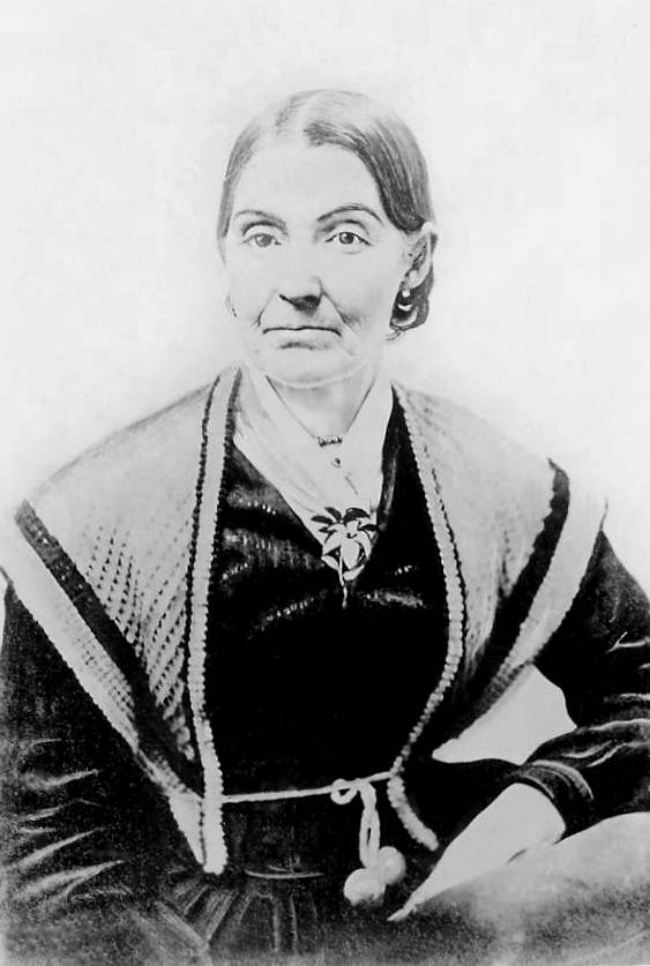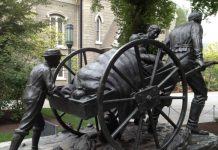
April 30, 2014 marks the 135th anniversary of the death of Emma Hale Smith, wife of the Prophet Joseph Smith.
According to Alexander, Emma seemed to sink away, but then she raised up and stretched out her hand, calling, “Joseph! Joseph!” Falling back on Alexander’s arm, she clasped her hands on her bosom, and her spirit was gone. Both Alexander and Joseph thought she was calling for her son Joseph, but later, Alexander learned more about the incident. Sister Elizabeth Revel, Emma’s nurse, explained that a few days earlier Emma had told her that Joseph came to her in a vision and said, “Emma, come with me, it is time for you to come with me.”
“As Emma related it, she said, ‘I put on my bonnet and my shawl and went with him; I did not think that it was anything unusual. I went with him into a mansion, and he showed me through the different apartments of that beautiful mansion.’ And one room was the nursery. In that nursery was a babe in the cradle. She said, ‘I knew my babe, my Don Carlos that was taken from me.’ She sprang forward, caught the child up in her arms, and wept with joy over the child. When Emma recovered herself sufficient she turned to Joseph and said, ‘Joseph, where are the rest of my children.’ He said to her, ‘Emma, be patient and you shall have all of your children.’ Then she saw standing by his side a personage of light, even the Lord Jesus Christ. (Gracia N. Jones, “My Great-Great Grandmother Emma Hale Smith”).
Emma Hale was the seventh child of Isaac and Elizabeth Lewis Hale, born July 10, 1804, in Harmony, Pennsylvania. Emma met Joseph Smith in 1825 when he boarded with the Hale family. Despite her father’s opposition to Joseph, due primarily to the events, and rumors, surrounding the First Vision, Emma married Joseph on January 18, 1827, “preferring him to all others” (“Emma Smith’s Last Testimony,” Feb. 1879, the Reorganized Church of Jesus Christ of Latter Day Saints, Independence, Missouri (hereafter referred to as RLDS Archives). Published in Saints Herald, vol. 26, p. 289).
One of Emma’s terrible burdens was the death of her children. She and Joseph had eleven children, but only five lived to adulthood. Another was abuse suffered at the hands of mobs and imprisonment of Joseph. It’s hard to imagine the horror and fear she felt as she struggled to provide for her children’s basic needs while fleeing from mobs and suffering ridicule and harm from supposed friends. After one instance, while he was incarcerated, Joseph recorded that “the militia…went to my house and drove my family out of doors…and carried away all my property” (History of the Church 3:371).
Not until the Saints migrated to Nauvoo, did Emma have a settled home. The home she and Joseph created in Nauvoo also accommodated crowds of people-friends and strangers-in need of food, shelter, and hospitality. Emma gave of herself and her means to others.
“She was…naturally ambitious and her whole heart was in the work of the Lord and she felt no interest ex[cept] for the church and the cause of truth. Whatever Her hands found to do she did with her might and did not ask the selfish question shall I be benifited any more than any one else. If Elders were sent away to preach she was the first to volunteer her services to assist in clothing them for their journey and let her own privations be what they might” (Lucy Smith, preliminary ms, (as quoted in Donna Hill, Joseph Smith, The First Mormon, Garden City, New York: Doubleday, 1977, p. 348).

Emma eagerly served the Lord by compiling the church’s first hymnal and serving as the first president of the Female Relief Society of Nauvoo, later known as the Relief Society. Speaking of Emma in a revelation, the Lord said, “Hearken unto the voice of the Lord your God, while I speak unto you, Emma Smith, my daughter… Behold, thy sins are forgiven thee, and thou art an elect lady, whom I have called” (Doctrine and Covenants 25:1, 3). After Joseph’s martyrdom, Emma did not take her family west, instead choosing to remain in Nauvoo with Joseph’s ailing mother, Lucy Mack Smith.
Glimpses into Emma’s Life
Biographers Valeen Tippetts Avery and Linda King Newell shared insights into Emma’s life and experiences:
In Kirtland Emma worked with other women, helping gather supplies for the men who marched to Missouri with Zion’s Camp. She took in boarders during the building of the temple, and, with the expert help of William Wines Phelps, saw the publication of the first hymnal. But tensions within the Church flared and hostility from without became rampant, forcing Joseph to flee Ohio for his safety. Emma followed with the children, Julia, Joseph, and eighteen-month-old Frederick. She was again pregnant as they made their way to Missouri; Alexander Hale Smith was born at Far West on 2 June 1838.
Five months after his son’s birth, the Prophet Joseph entered a jail cell in Missouri. Mobs harassed Emma and broke into her home while her husband was held prisoner in Liberty Jail. They did not, however, destroy Joseph’s valuable papers—among them his translation of the Bible—which were kept safe by his scribe, James Mulholland. James’ sister-in-law, Ann Scott, wrote:
“Bro. Mulholland requested me to take charge of these papers, as he thought they would be more secure with me, because I was a woman, and the mob would not be likely to search my person. Immediately on taking possession of the papers, I made two cotton bags of sufficient size to contain them, sewing a band around the top ends of sufficient length to button arount my waist; and I carried those papers on my person in the day-time, when the mob was round, and slept with them under my pillow at night … I gave them to sister Emma Smith, the prophet’s wife, on the evening of her departure for Commerce.”
Emma and her young children fled Missouri with other Church members following Governor Boggs’s extermination order (see History of the Church, 3:175). When the Saints surveyed the frozen Mississippi River, they discovered the ice was not thick enough for the travelers to cross in their wagons. Instead, they walked scattered out over the ice. Emma carried Frederick and Alexander; Julia and Joseph III clung to her dress. Strapped under her skirts were the bags that Ann Scott had sewn containing the only copy of the Prophet’s translation of the Bible.
Safe in Quincy, Illinois, Emma wrote of her ordeal to Joseph who was still confined in the Liberty Jail:
“Was it not for … the direct interposition of divine mercy, I am very sure I never should have been able to have endured the scenes of suffering that I have passed through … but I still live and am yet willing to suffer more if it is the will of kind Heaven, that I should for your sake. … No one but God, knows the reflections of my mind and the feelings of my heart when I left our house and home, and almost all of everything that we possessed excepting our little children, and took my journey out of the State of Missouri, leaving you shut up in that lonesome prison” Emma Smith to Joseph Smith while he was in Liberty Jail (7 Mar. 1839, Joseph Smith Letterbook, Church Hist. Dept. Archives).
Emma rarely reflected upon her problems but in one letter to [her son] Joseph wrote: “How often I have been made deeply sensible that my pilgrimage had been an arduous one and God only knows how often my heart had almost sunk when I have reflected how much more arduous and trying your work was to be. I have often thought that I know just as well as any other person just how St. Paul felt when he said, ‘If only in this life we have hope, we are of all men most miserable.’ ” [1866]
Emma’s daily routine changed slowly as she aged. According to a granddaughter, she napped thirty minutes after the heavy noon meal and occasionally took time to read a copy of Godey’s Lady’s Book. While she tended the pansies and violets that bordered the rocks around the Mansion House she hummed, “There’s a Feast of Fat Things for the Righteous Preparing,” and “The Flowers That I Knew in the Wildwood.” Her favorite flowers were lilacs—”lay-lacs” she called them—and the immense planting of them by the kitchen door helped to hide the peeling paint of the old house.
Emma’s eyesight began to fade in 1867, and she fussed in irritation when the press of duties did not allow her enough time to write to Joseph and Julia in the daylight and her broken spectacles were useless in the lamplight. She thought she overtaxed her eyes with too much sewing. Emma always had boarders to care for, linens to wash, and meals to prepare. (Linda King Newell and Valeen Tippetts Avery, Mormon Enigma: Emma Hale Smith; Prophet’s Wife, “Elect Lady,” Polygamy’s Foe, 1804-1879 (Garden City, New York: Doubleday & Company, Inc., 1984), pp. 279-80).
Testimony of Emma
“I desire with all my heart to honor and respect my husband as my head, ever to live in his confidence and by acting in unison with him retain the place which God has given me by his side.”
“I desire the spirit of God to know and understand myself, I desire a fruitful, active mind, that I may be able to comprehend the designs of God, when revealed through his servants without doubting.” (Emma Hale Smith blessing, typescript, LDS Archives. Emma asked Joseph for a blessing before Joseph left for Carthage. The Prophet told her to write the best blessing she could, and he would sign it upon his return.)
“I believe he [Joseph] was everything he professed to be” Emma to Parley P. Pratt (Statement of Nels Madsen, 27 November 1931, LDS Archives. (Nels Madsen accompanied Parley P. Pratt on his visit to Nauvoo.)
“My belief is that the Book of Mormon is of divine authenticity. I have not the slightest doubt of it. … Though I was an active participant in the scenes that transpired, and was present during the translation of the plates … and had cognizance of things as they transpired, it is marvelous to me, ‘a marvel and a wonder,’ as much as to anyone else.” Describing her experience, she said: “The plates often lay on the table without any attempt at concealment, wrapped in a small linen tablecloth which I had given him [Joseph] to fold them in. I once felt the plates as they lay on the table, tracing their outline and shape. They seemed to be pliable like thick paper, and would rustle with a metallic sound when the edges were moved by the thumb, as one does sometimes thumb the edges of a book.” She also testified, “I know Mormonism to be the truth; and believe the church to have been established by divine direction” Emma in an interview with her sons (Emma Smith’s Last Testimony,” Feb. 1879, RLDS Archives).
Thoughts on Emma By Three Women Who Knew Her
“I have never seen a woman in my life, who would endure every species of fatigue and hardship, from month to month, and from year to year, with that unflinching courage, zeal, and patience, which she has ever done; for I know that which she has had to endure—she has been tossed upon the ocean of uncertainty—she has breasted the storms of persecution, and buffeted the rage of men and devils, which would have borne down almost any other woman” Lucy Mack Smith, Emma’s mother-in-law (Lucy Mack Smith, History of Joseph Smith (Salt Lake City: Bookcraft, 1958), pp. 190–91).
“Sister Emma was benevolent and hospitable; she drew around her a large circle of friends, who were like good comrades. She was motherly in nature to young people, always had a houseful to entertain or be entertained. She was very high-spirited and the brethren and sisters paid her great respect. Emma was a great solace to her husband in all his persecutions and the severe ordeals through which he passed; she was always ready to encourage and comfort him, devoted to his interests, and was constantly by him whenever it was possible. She was queen in her home, so to speak, and beloved by the people, who were many of them indebted to her for favors and kindness” Emmeline B. Wells (“LDS Women of the Past: Personal Impressions,” Woman’s Exponent36 (February 1908): 1).
“Her eyes were brown and sad. She would smile with her lips but to me, as small as I was, I never saw the brown eyes smile. I asked my mother one day, why don’t Grandma laugh with her eyes like you do and my mother said because she has a deep sorrow in her heart” Granddaughter, Emma Belle Smith Kennedy (Journal of Emma Belle Smith Kennedy, daughter of Alexander Hale Smith, in possession of Gracia N. Jones).
Thoughts on Emma By Her Family
Joseph spoke of Emma with great love and respect,
“With what unspeakable delight, and what transports of joy swelled my bosom, when I took by the hand, on that night, my beloved Emma—she that was my wife, even the wife of my youth, and the choice of my heart. Many were the reverberations of my mind when I contemplated for a moment the many scenes we had been called to pass through, the fatigues and the toils, the sorrows and sufferings, and the joys and consolations, from time to time, which had strewed our paths and crowned our board. Oh what a commingling of thought filled my mind for the moment, again she is here, even in the seventh trouble—undaunted, firm, and unwavering—unchangeable, affectionate Emma!” (History of the Church, 5:107).
Joseph Smith III wrote,
“My mother endeared herself to the entire community. To those within her reach she had ever been an unfailing source of comfort and assistance in all the varied troubles to which ordinary households are subject. As the long stream of people passed by her bier, there was often noted the silent gaze of sorrow, the gently falling tears, or the touch of living hands upon those folded in death, all mute testimonies of the love and appreciation which had been cherished for her in the hearts of her friends and neighbors” (Joseph Smith III and the Restoration, p. 284).
Alexander Hale Smith’s letter of March 6, 1874 conveys his deep love and tenderness for his mother. (original spelling intact)
Dearest Mother
T’is a long time since I wrote to you, and I expect you begin to think I am forgetful of my duty, and am rather a bad boy. I confess I have been negligent, but not forgetful, No Mother I have not been forgetful, of you, There is not a day passes over my head, or a night in which I lie myself down to rest, but I think of my Mother, and oft times when my head is racked with pain I wish I could lay my aching brow, as of yore, in my Mothers lap and feel her kind hand smoothing, caressingly, my tangled locks, and hear her comforting voice cheering me, bid[d]ing me to look forward to a “better day coming”
I some times think could I do this I would be better armed to fight the battle of life, I am called upon to fight, and again I often think, of the dear old home and all its surroundings, and wonder why, us boys are all called away, so far from her who bore us, and has borne with our waywardness in the days of our youth, and now when we ought to be near, to comfort, cheer, and help her. Many miles seperate us, and prevent our doing what we would so love to do. And I have become a wanderer on the face of the earth, going to and fro, not knowing one day where I may be called the next. My wife and little ones forsaken and left alone. T’is time I am trying to do the Fathers will, yet t’is nevertheless hard, to be sundered from those we love so well, and though I am a wanderer, I hope I am not a cast away, but that a day will come when my wanderings will be over, and I be permitted to join, Father, Mother, Sister[,] Brothers, Wife and children no more to be seperated, but to dwell together forever.
Milestones in the Life of Emma Hale Smith
10 July 1804 Born at Harmony, Pennsylvania.
18 Jan 1827 Marries Joseph Smith, Jr., at South Bainbridge, New York.
15 Jun 1828 Son Alvin is born and dies; buried at Harmony.
28 Jun 1830 Emma baptized at Colesville, New York.
Aug 1830 Emma confirmed a member of The Church of Jesus Christ of Latter-day Saints.
Jan 1831 Emma’s last farewell to her parents.
2 Feb 1831 Arrival at Kirtland, Ohio.
30 Apr 1831 Twins are born and die at Morley Settlement.
May 1831 Joseph and Emma adopt Julia and Joseph Murdock, twin infants of Joseph and Julia Murdock, after their mother dies from complications relating to childbirth.
24 Mar 1832 Joseph Smith beaten by mob at Hiram, Ohio; baby Joseph exposed to cold during mobbing.
27 Mar 1832 Joseph Murdock Smith, age ten months, dies as result of exposure.
6 Nov 1832 Son Joseph Smith III born at Kirtland, Ohio.
9 Dec 1834 Emma receives her patriarchal blessing.
1835–1836 Hymnal compiled by Emma published.
The Lord asked Emma “to make a selection of sacred hymns.” (Doctrine and Covenants 25:11.) The hymnal, compiled in 1835, was actually published in 1836. (Courtesy of LDS Archives.)
20 Jun 1836 Son Frederick Granger Williams Smith is born at Kirtland, Ohio.
Jan 1838 Smith family flees Kirtland, Ohio; travels across Ohio, Indiana, and Illinois.
Feb 1838 Family crosses frozen Mississippi River into Iowa.
14 Mar 1838 Family arrives at Far West, Missouri.
2 Jun 1838 Son Alexander Hale Smith is born at Far West, Missouri.
Nov 1838 Church leaders are arrested. Joseph is imprisoned in Liberty Jail. Emma visits him three times: 8 December 1838; 20 December 1838; and 21 January 1839.
7 Feb 1839 Emma and family leave Far West, Missouri.
14 Feb 1839 Emma and children arrive at Quincy, Illinois.
22 Apr 1839 Joseph arrives at Quincy after nearly six months of unjust confinement in Missouri.
9 May 1839 Smiths move to Commerce (Nauvoo), Illinois.
13 Jun 1840 Son Don Carlos is born.
15 Aug 1840 Baptism for the dead is taught by Joseph Smith; Emma is baptized soon after in the Mississippi River in behalf of her mother and sister.
7 Aug 1841 Joseph’s brother, Don Carlos, dies.
15 Aug 1841 Son Don Carlos, age fourteen months, dies.
6 Feb 1842 Birth of unnamed stillborn son.
17 Mar 1842 Relief Society is organized; Emma chosen as president.
Summer/Fall 1842 Joseph is in hiding. Emma and children are ill; Emma nearly dies. Joseph returns home to bless his family.
17 Aug 1842 Emma writes a letter to Governor Carlin defending Joseph.
18 Jan 1843 Grand celebration at Joseph and Emma’s home for their sixteenth wedding anniversary and his acquittal.
Spring 1843 Joseph becomes mayor of Nauvoo.
28 May 1843 Emma sealed to Joseph for eternity.
31 Aug 1843 Smiths move into the Mansion House.
By 28 Sep 1843 Emma receives her endowments.
Fall 1843 Emma supervises women’s temple ordinances October 1843 through February 1844.
17 May 1844 Joseph accepts nomination to run for president of the United States.
22 Jun 1844 Joseph is ordered to Carthage, Illinois, for hearings; faced with the prospect of certain death, Joseph crosses to Iowa side of the Mississippi River.
23 Jun 1844 Joseph and Hyrum decide to go to Carthage, Illinois.
24 Jun 1844 Emma and Joseph see each other for the last time.
27 Jun 1844 Emma serves dinner to Governor Ford and sixty of his men in Nauvoo Mansion House about 5:00 p. m. Emma learns about 10:00 p. m. that Joseph and Hyrum have been shot and killed.
17 Nov 1844 Son David Hyrum Smith is born.
Feb 1846 Emma remains in Nauvoo when Saints go west.
12 Sep 1846 Emma leaves with her family as mobbers invade Nauvoo; she goes to Fulton, Illinois, then returns four months later.
23 Dec 1847 Emma marries “Major” Louis C. Bidamon.
1856 Emma takes in orphaned Elizabeth Agnes Kendall, eight years old, and rears her as her own daughter.
14 May 1856 Lucy Mack Smith dies, having spent the last three years of her life in Emma’s care.
22 Oct 1856 Joseph III marries Emmeline Griswold.
1857 Emma’s nephew Samuel H. B. Smith visits her.
13 Sep 1857 Son Frederick Granger Williams Smith marries Annie Marie Jones.
6 Apr 1860 Son Joseph III becomes president of RLDS.
23 Jun 1861 Son Alexander Hale Smith marries Elizabeth Agnes Kendall.
13 Apr 1862 Son Frederick Granger Williams Smith dies.
1866 Emma gives Joseph’s revision of Bible to Joseph III to print.
About 1870 Emma begins caring for Charles, six-year-old son of Louis Bidamon and Nancy Abercrombie.
10 May 1870 Son David Hyrum marries Clara C. Hartshorn.
1871 Emma and family move into rebuilt Nauvoo House, later renamed Riverside Mansion.
1875 Emma’s sons leave Nauvoo; Alexander moves to northern Missouri, and Joseph III moves to Iowa.
1877 Emma’s adopted daughter, Julia, suffering from cancer and deserted by her husband, comes to live with Emma.
17 Jan 1877 Emma’s son David Hyrum committed to Illinois State Asylum.
Feb 1879 Last testimony given by Emma in an interview with her sons. Emma testifies that Joseph Smith was a prophet, relates her experience with the Book of Mormon, testifies of her belief in the divine origin of the Book of Mormon.
30 Apr 1879 Emma dies in her seventy-fifth year, on the anniversary of the death of her Kirtland twins.






